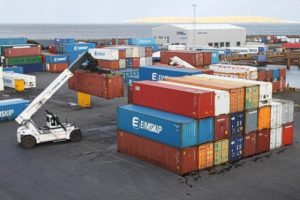 Total shipping container production is expected to decline by 36% in 2019 compared to 2018 as factory inventory continues to grow, forecasts Drewry, noting that China alone has over one million TEUs stockpiled in depots.
Total shipping container production is expected to decline by 36% in 2019 compared to 2018 as factory inventory continues to grow, forecasts Drewry, noting that China alone has over one million TEUs stockpiled in depots.
In addition, prices of new and secondhand shipping containers as well as lease rates declined in the third quarter of the year as stocks built up and prospects for container shipping cooled, the maritime research and consulting service provider said.
Dry box prices fell 5.5% over the quarter while reefer values remained stable. Drewry’s Dry Shipping Container Newbuild Price Index, which tracks values of new 40-foot-high cube containers, dropped four points in the quarter to a value of 82, representing an annual decline of 20%.
But the reefer price index, based on the prevailing value of new 40-foot high-cube reefer containers, was unchanged at 89, having declined just 3% over the year. However, container resale prices remained broadly stable.
Container shipping remains challenged by rising geopolitical uncertainty and a slowdown in the global economy, prompting Drewry to recently cut its forecast for global container port throughput in 2019 from 3% to 2.6%.
“Add to this the growing number of boxes stockpiled in depots around China, estimated to be over one million TEU, and it’s no surprise that the container manufacturing and leasing sectors posted disappointing results in 3Q19,” Drewry said.
The falling market affected leasing rates, which were lower for all container types, both compared with the previous quarter and year-on-year. The fall in per diem rates was most severe in the dry box sector with average less-than truckloads 26% lower year-on-year.
Drewry added that it does not think per diem rates for all containers will return to their 2018 or even 2017 levels in 2019.
It meant that lease rates lost some ground against newbuild prices and this could result in lessors ordering fewer boxes in the future.
“This situation may have already started as lessors reduced their purchases by as much as 60% compared to 2Q19,” said Drewry.
Over the past year leasing sector acquisitions have fallen 22%. In contrast, transport operators were more active and accounted for 59% of newbuild purchases in the quarter.
For the second quarter in succession, transport operators purchased more reefers than lessors, with Ocean Network Express and Hapag-Lloyd among those carriers taking delivery of a substantial amount of new equipment.
“Both lines are expanding their reefer services and needed the additional boxes to satisfy expected demand in 4Q19 and early 2020,” Drewry said.
However, over the medium term Drewry still expects lessors to increase their share of the global container pool as shipping lines’ priorities lie elsewhere, notably in upgrading their IT systems and door-to-door service offering.
“The decrease in box prices heaped further pressure on container manufacturers, which despite cutting costs, are barely breaking even in the current trading environment. This year has already seen Singamas withdraw from the dry box building business and further rationalisation of capacity cannot be ruled out,” said Drewry.
A glut of newbuild dry box containers and falling values forced manufacturers to slash output which fell over 50% in the quarter, although reefer production remained stable. Drewry is “now projecting that total shipping container production will end the year having fallen 36% compared to 2018.”
Photo By NAC
